- Home
- Allan Topol
Enemy of My Enemy Page 4
Enemy of My Enemy Read online
Page 4
Joyner nodded to the others and sat down next to the vice president.
"Chip, you wanted to open this up," Kendall said, looking across the table at the portly defense secretary.
"Yeah. There's a new development," Morton replied, his voice brimming with enthusiasm.
Joyner wasn't surprised that she was hearing about this for the first time in the meeting. Ever since McCallister's plane had been shot down, Chip had been engaged in a turf battle with Joyner to take charge of the rescue effort. Arguing that the life of a military man was at stake, Chip, with the tacit acquiescence of General Childress, contended that DIA, the Defense Intelligence Agency, should take the lead, and Joyner's CIA should merely provide assistance when asked. For the first two days Joyner had fought Chip tooth and nail. She didn't give up the battle until the president had taken her aside after one of the team meetings. With Grange standing next to him, he told her, "Back off, Margaret. Let Chip and General Childress run with the ball. It's one of their boys who's down."
All eyes were focused on Chip. He paused, coughed, and cleared his throat, drawing out the suspense.
"For chrissake, spit it out already," Kendall said.
Undeterred, Chip began speaking slowly. "We have been carefully analyzing satellite photos and communications Lieutenant McCallister had before his plane was shot down. Those all clearly point to the Turks being the perpetrators."
Kendall leaned back in his chair and gave a deep sigh. "Jesus, they're our ally."
"It's possible," the conciliatory Doerr interjected, "that one of their guys with his finger on the button in a SAM battery got trigger-happy."
Kendall ignored the words of his secretary of state, as he often did, and turned back to Chip. "Do you have any information about the pilot?"
Chip coughed again. "Following the decision at yesterday's meeting, we put a six-man special-ops unit commanded by Major Davis on the ground in the area where the plane went down. It's remote, mountainous terrain. Lots of caves. Very little vegetation. Only a couple of small, isolated villages, one with a name I can't pronounce, in the immediate area. Davis has been interrogating people."
"Any confrontation with Turkish or Kurdish forces?" the president asked.
Chip turned to General Childress, who picked up the briefing in a heavy Alabama accent. "No engagement as of an hour ago, sir."
"Good. What have they learned?"
Childress reached down to the floor and brought up a cylindrical silver tube. From it he extracted a map, which he spread on the table. "Outside of this village," he said, pointing, "is where Major Davis and his men found pieces of the plane. What they've learned is that Turkish soldiers seized Lieutenant McCallister. They had to pull him away from an angry mob. After that, they drove him off in an army truck."
"Bastards," Kendall muttered. "How do we know all this?"
"Major Davis has bought an informer from the area with cash and a promise to fly the man out of the country when this is over. Ishmael's his name. He agreed to go with Davis and help us find out where they took Lieutenant McCallister."
The president was pleased. Finally they were making some progress. "If Major Davis finds out where the Turks are holding McCallister, I assume that he'll go in and try to rescue the pilot?"
"Your orders were no engagement until you personally approved it," Childress said. "You can change that if you want. It's your decision, Mr. President."
Kendall looked around the room. "Anybody see a downside to my giving Major Davis a blank check? Letting him go in with whatever force he thinks is needed to get our pilot out?"
Jimmy Grange responded in a soft voice: "Lieutenant McCallister might get killed in any rescue effort. Maybe we should run it by Terry first."
Kendall looked at General Childress. "What are the chances of losing Lieutenant McCallister in any rescue effort?"
Childress tried to be patient. It was the kind of ridiculous question the general had grown accustomed to hearing from civilian leaders in Washington over the years. "Major Davis has an elite unit specially trained for this type of operation. They're the best we have."
The president tapped his fingers on the table. "Terry McCallister's been leaning hard on me to do something. If the military people think this makes sense, Terry's got no basis to bitch. Besides, he's not running the country."
Grange was preparing to respond, to remind Kendall how much money Terry had raised and contributed in the last campaign and how valuable he would be the next time around. As his mouth opened, he caught himself. That would be a mistake. He knew Kendall well enough to realize his words would only irritate the president, who wanted to believe that none of his decisions were politically motivated.
Before Kendall could decide, the secretary of state spoke up. "As you said before, Turkey's an ally. I can't believe that Ankara authorized this. That means they have renegades in their military who pulled this off. People who hate the United States because of the war in Iraq. It's only fair that we give the Turkish government the opportunity to deal with this matter themselves."
Doerr's haughty manner, as he looked over those little glasses of his, annoyed Kendall. Putting him in the job of secretary of state had been a mistake. But he did have a point here. Giving Ankara a chance to deal with it wasn't a bad idea. Also it would be a way of avoiding the decision authorizing military action.
Kendall shook his head in frustration. "God, what a mess."
Joyner looked away from the table and through the window at the trees struggling to bloom. She was no longer unhappy about being a bit player in this drama. For now she was willing to wait in the wings. Her gut told her they weren't about to rescue Robert McCallister. They would need her before this was over. She wasn't burning any bridges.
Meanwhile, the president closed his eyes, pondering the decision he had to make. If anyone thought that being the governor of a state prepared a person for this job, they were kidding themselves. It was Kendall's first foreign-policy crisis. No matter which way he went, the press would second-guess him. No one made a sound. The tension was heavy. Finally, Kendall opened his eyes and pointed to his secretary of state. "I want you to summon the Turkish foreign minister to your office as soon as you leave this room. Chip should be at that meeting. Tell the ambassador that we now have irrefutable evidence that the Turkish military shot down the plane, and provide it to him. His government has twenty-four hours to return our pilot, or we intend to take appropriate action.... Don't tell him any more than that. Do you understand?"
Doerr and Chip nodded.
Kendall turned to General Childress. "If we don't have Lieutenant McCallister back in twenty-four hours, give the order for Major Davis to mount the rescue effort."
Chapter 4
Standing on the center of the stage, in front of the orchestra, Gil Shaham moved the bow across the strings of his violin with confidence and intensity. The glorious music of Bach's Violin Concerto in A Minor that emerged testified to the young man's genius. No other sound was heard in the Mann Auditorium in Tel Aviv other than Gil's playing until the Israeli Philharmonic picked up and joined him, meshing perfectly. In the sold-out, richly wood-paneled auditorium, everyone in the audience sat spellbound, entranced by the music. Well, almost everyone.
In row K of the center section, Jack Cole wasn't hearing a sound. Unable to shake off Sam's visit, his mind had taken him thousands of miles and years away to the north side of Chicago, to a block of simple middle-class homes, the Coles on the corner, and the Goodmans, Sarah's family, next door. To his hardworking father, Joe, who covered the metro beat, which usually meant crime and corruption stories for the Trib. To his mother, Miriam, raised in a Zionist family, who never tired of working for Jewish charities. To Friday-night dinners, the only night that his father would come home for dinner on time, no matter what crisis was breaking over at city hall. Sometimes relatives joined them, but usually it was just the four of them, Joe at one end of the table, Miriam at the other. On the sides, sitting across from
each other, Jack and the little guy, Sam, the miracle child who was born years after doctors told Miriam there was no chance. Sam was the brother Jack desperately wanted during all those years he had been an only child. All his friends had siblings. He had given up hope by the time his mother became pregnant. From the minute they brought Sam home, Jack had loved the little guy so much.
Now Joe and Miriam were gone. Other relatives had perished in Europe in the Holocaust or were scattered throughout the American West. Jack had never seen or heard from any of them since his mother's funeral. It was just Jack and Sam now. Jack and the little guy.
"Damn you, Sam," he muttered under his breath. "How could you have put me in this position?"
There was a pause in the music before the orchestra began the last movement of the Bach, the final piece of the evening. Next to Jack sat Chava, the world-renowned opera singer, whom he had been dating for a year. Chava, tall and sensuous, with coal-black hair, was dressed in a low-cut red dress that showed off her striking décolletage. Chava whispered in Jack's ear, "Isn't Gil marvelous?"
But Jack didn't hear her. Nor did he respond when she put one hand around his back and rubbed his thigh with the other. The orchestra began playing again. Jack wasn't with them.
He was deep in thought. Anger and guilt vied to dominate. He was furious at Sam for not appreciating the raw nerve he had struck. It was unconscionable that Sam didn't accede to what Jack had asked and back off.
It wasn't merely Sam. Jack was still bitter at Sarah and Terry—even after all these years. Terry had been such a patently obvious phony, and she a ridiculous fool for not seeing it.
Despite all of that, Jack couldn't repress the guilt that he felt. Sam had pushed the right button. He kept hearing in his mind his brother's bitter rebuke: When it comes to the family, you were a shit then; you're a shit now.
The words had stung yesterday. They stung even more this evening. Well, you're wrong, Sam. I'm not like that at all.
The orchestra moved toward the crescendo in the last movement. Jack began to wonder whether his anger toward Sarah and Terry had pushed him to an irrational result. Ann and Robert hadn't done anything to him. He had no score to settle with them.
Thinking about Robert made Jack feel horrible. He knew what had happened to Israeli soldiers who had been captured, how cruelly nations in the Middle East treated their prisoners. He could imagine the tortures that they were inflicting on Robert. If there was anything he could do to help the young man, shouldn't he do it?
Besides, it was his brother, Sam, who was begging him for help. Not Sarah or Terry. He wouldn't be doing it for the McCallisters. Whatever he did would be for Sam. Only for his brother, whose happiness was now tied up with the fate of Robert McCallister.
The music reached its final pitch. As it did, Jack stripped away the emotional baggage he carried with him. Seen in that light, the issue looked much different. He had to do whatever he could to help the little guy.
The concert was over. The audience rose to its feet, applauding. That brought Jack back to reality. He put an arm around Chava's shoulder and said to her, "Incredible. Absolutely incredible."
As they made their way out of the hall, people came up to Chava and greeted her. "I saw you in December in London. Your Dona Elvira in Don Giovanni was fabulous... your Golda in Rigoletto last month in Tel Aviv was the best ever...."
Jack loved being with her, and the admiration she received. She was fun and the sex was great, although with her career, their relationship wasn't going anywhere. He knew that when he was in the country, she viewed him as someone enjoyable to be with on her intervals at home in Israel between demanding performances on the road. That was enough for Jack.
On the concrete plaza outside of the concert hall, with Chava on Jack's arm, a photographer for the popular newspaper, Yediot Aharonat, took their picture. Jack smiled broadly.
When they reached his car, he said, "It's a beautiful evening. Let's drive over to Yafo and eat outside."
"Actually, I had something different in mind." She winked at him. He knew what that meant.
"I asked Alexandra to leave us a cold supper at my place. I've got an early plane to New York tomorrow to start rehearsals at the Met. Besides, I'd like to get out of these clothes and into something more comfortable."
She rubbed a hand on the back of his neck, lest he had any doubt about what she had in mind. But Jack didn't. He knew her.
"You seemed so preoccupied at the concert," she said.
Unwilling to share his concerns with her, he tried to brush them off. "Just business. Same old crap. A Frenchman cheated me, so I'll have to cover an order for an American."
"Ah, the French. Why do they hate us so much?"
Jack laughed. "This wasn't politics. Just business."
"With them it's always politics. I haven't had a role in the Paris Opera in years. You tell me why?"
Jack was silent. The nature of their relationship was such that he didn't share his personal thoughts with her.
Once they reached her apartment, Chava said, "Why don't you see what wine I've got chilled? I'll put on that little Dior number you brought for me from Paris. The sheer pink one."
"Sounds great," Jack said, feeling himself become aroused as he imagined what she'd look like in it.
In the refrigerator, he found a bottle of Corton Charlemagne by Latour he had given her, and opened it.
The phone rang. "My agent in New York," she called. "I'll just be a minute, honey."
Waiting for her, Jack thought about Sam again. His conclusion at the concert had been right. He owed it to his brother to do what he could. Now determined, Jack yanked the cell phone out of his jacket pocket. From memory, he dialed Moshe's home telephone number in Jerusalem.
* * *
The director of the Mossad sat at the desk in his study in the old stone house he had occupied in the Rehavia section of Jerusalem since 1943. Inside it was a time warp. His wife, Leah, had furnished it in the early fifties. That was the way it still looked.
He moved his pen swiftly across the pad, preparing his statement for the cabinet meeting tomorrow morning at eight. The prime minister would be grilling him about Robert McCallister. Moshe knew that the Israeli leadership was split. Some were hoping that the Americans responded militarily. Others were afraid of creating further instability in the already tumultuous region.
Though Moshe had slept little since Leah had died last year, he didn't intend to spend too much time tonight worrying about this matter. For Moshe, the issue was simple after his conversation yesterday with Joyner. He scribbled, The Americans don't want our help. Joyner has made that crystal-clear. They will do what they want to do, and we'll have to live with the consequences as best we can because this is our neighborhood. It's their pilot. It's their decision. We should stay out of it.
Moshe expected a stormy debate, but in the end he was confident that the prime minister and the cabinet would accept his recommendation. The fate of Robert McCallister was an American problem. Israel would be willing to help, if that was what Washington wanted, but Joyner had told him Kendall was adamant about going it alone. Right or wrong, that was Kendall's decision. Moshe was convinced the Israelis should respect it.
He closed up the pen and stood at his desk. Then the telephone rang. "Who's calling, please?" Moshe asked.
"It's Jack Cole. I have a matter I want to talk to you about. It involves—"
Moshe cut him off. He had no idea how secure Jack's phone was.
"Where are you, my boy?" Moshe asked.
"Tel Aviv."
"We should talk in person. You can come here tonight, unless it can wait until tomorrow."
Jack thought about Chava in that pink negligee and decided it wasn't even a question. "Tomorrow will be good."
The cabinet meeting was scheduled for two hours. "My office at eleven in the morning," Moshe said.
"I'll be there."
As Moshe hung up the phone, he wondered what in the world this myste
rious call was about. Though Moshe liked Jack and the work he did for the agency, Jack had never called Moshe at home unless they were in the middle of an operation. He hoped that there weren't repercussions from the Khalifa assassination. The last thing Moshe needed right now was a new crisis with France.
Chapter 5
A smartly dressed middle-aged secretary with large tortoise-shell glasses ushered Jack into Moshe's office. She handed them each a cup of Turkish coffee and rapidly departed.
With Moshe, there was no small talk. Before Jack could get settled in a chair in front of the large, empty wooden tabletop desk, the Mossad director said, "You did a good job on Khalifa in Marseilles."
Pleased with the compliment, Jack smiled. "If people transport explosives in their cars, sometimes they get blown up."
Moshe returned Jack's smile. "That's what I told the French when they called to chew me out. Since they refused to extradite him to Israel despite all the evidence we presented of his murders, they should be grateful for what we've done. He would hardly be a law-abiding citizen in their country. Have you heard anything about it in France?"
Jack thought about Moreau's visit to his Paris office. The Frenchman hadn't mentioned Khalifa's assassination. "Not a word," Jack said. He didn't want Moshe to pull him from Paris.
"Good. I was worried that's why you came to see me."
Jack glanced at his watch, not wanting to take too much of Moshe's valuable time. "I have something quite different to talk with you about. Perhaps you can help me... and it may be in Israel's interest as well."
Jack's words hooked Moshe. "Okay. Talk, my boy," Moshe said in his typically no-nonsense, brusque manner, while lifting the small cup to his lips.
Jack took a deep breath. In the hours since he had made the call to Moshe, he had thought long and hard about where to start. The story began back in Chicago forty-three years ago, when he was five and the Goodmans, Sarah's family, moved in next door, but Moshe didn't need to know any of that. Begin with the present, he had decided. The words tumbled out. "An American pilot by the name of Robert McCallister was shot down over southeastern Turkey."

 Conspiracy
Conspiracy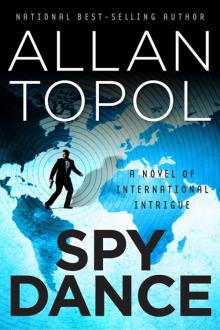 Spy Dance
Spy Dance The Argentine Triangle: A Craig Page Thriller
The Argentine Triangle: A Craig Page Thriller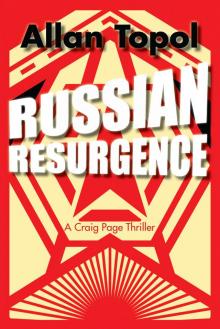 Russian Resurgence
Russian Resurgence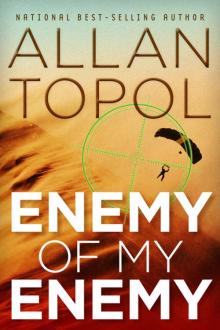 Enemy of My Enemy
Enemy of My Enemy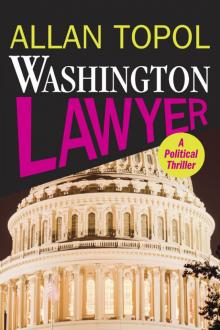 The Washington Lawyer
The Washington Lawyer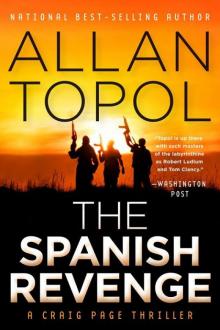 THE SPANISH REVENGE (Craig Page series)
THE SPANISH REVENGE (Craig Page series)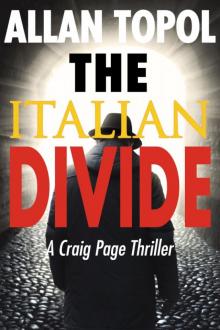 The Italian Divide
The Italian Divide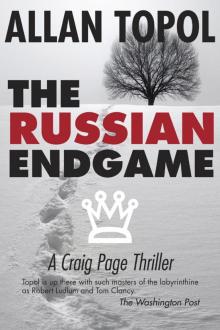 The Russian Endgame
The Russian Endgame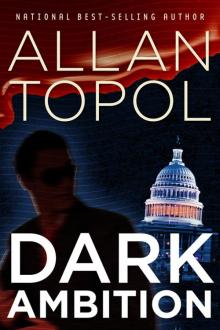 Dark Ambition
Dark Ambition